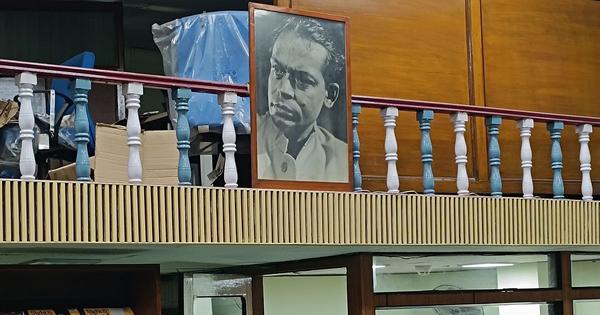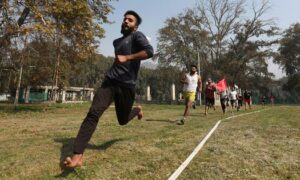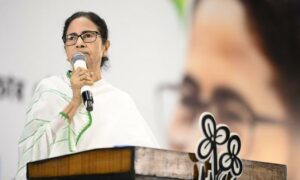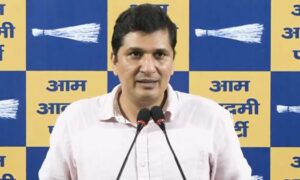
We are talking about 1955-56. Nagarik had been made, and its release scotched in 1952. He married Surama in mid-1955. The story of those years – Ritwik’s time in the city he called ‘rotten’ and ‘crude’ and ‘materialistic’ and ‘completely unsuited to any creative work’ – is to be found in the letters he wrote to his wife, published by her in a book titled Ritwik (Anustup Prokashoni, 1996).
In the letters, we find a young man, just around thirty, missing his wife (to-be, to start with) and his city and the avenues to channel his creativity; not being able to build with his wife the life they might have hoped for, but also a man full of hope. Hope that he would be able to do something useful while at Filmistan; hope that he would earn enough money to put some sort of life together for his family; and that it would be the start of better things for him as a creator.
‘I just received a telegram from Salil Chowdhury, quite out of the blue. “Filmistan job almost fixed. Passage, hotel expense free. Start immediately!” We had a casual conversation around a year ago, and then this,’ Ritwik writes in a letter dated 26 April 1955, in which he charts out his plans. ‘I
don’t have the money to buy a plane ticket. If you can wire me the money, I can travel on the 2nd [of May] and return to Calcutta by the 5th, catch a flight to Shillong and get married, and join work by the 15th. You and I can stay in Bombay for a month or so.’
‘I won’t get the job’
As is evident, at no point did Ritwik have any illusions about Filmistan or Bombay. He wanted to take up the job for the money. He was thirty. About to be married. Not many paisas to his name, and living rent-free in the house of a friend, Bhupati Nandy, who worked in the theatre and in cinema. He had made one full-length film that no one had seen – Nagarik – and Nandy was part of the group that had produced the film.
In short, it was all looking rather bleak for Ritwik. And while alcohol hadn’t made an appearance yet, it would soon. He would be expelled from the Communist Party of India by the end of the year.
‘If the contract comes through, I will get a lump sum straightaway. We won’t have any trouble setting up home. I can repay all debts and clear out of Bhupati’s house. We won’t have any worries; we can begin a new chapter.’ But he wasn’t counting his chickens yet. ‘I am going by the assumption that I won’t get the job.’
The job at Filmistan, as a writer, did come through. That’s how we got Musafir and Madhumati (later tweaked and made in Bengali as Rajkanya). The couple first moved into Hrishikesh Mukherjee’s house in Andheri. Bimal Roy’s studio was close by. Salil Chowdhury lived not far away. Keshto Mukherjee, who had made his acting debut with Nagarik and would later do small roles in Musafir, Ajantrik and Bari Theke Paliye, ‘stayed with us for a year as he was looking for work’, Surama writes.
What a fun time they must have all had. Ritwik had started writing for Filmistan – or trying to write – and they shifted, not long after moving to Bombay, to a flat in Goregaon, close to where Filmistan was.
At some point, they must have gone back to Calcutta, possibly to drop Surama back. And, upon returning to Bombay, Ritwik writes on 30 June 1955, ‘Salil tells me that Mukherjee [Sasadhar Mukherjee, the co-founder of Filmistan] was miffed that I didn’t meet him while in Calcutta, and that I have become useless after getting married and he had made a mistake by giving me the job. Anyway, I met him [Mukherjee], told him some vague things and have joined work formally.’
‘It doesn’t look exciting at all’
Job in the bag, there was the question of work. And it started on the wrong foot. ‘It doesn’t look exciting at all. To be honest, there is no work. I just have to write some rubbish for the heck of it and go sit in the office from 10 a.m. to 5 p.m. I don’t think I can do much here seeing Mukherjee’s aversion towards me. I just have to grit my teeth and try to earn some money. I don’t know how successful I will be, but there is nothing else to do here. Doing good work, trying to prove my creative ability or trying to find fame … all of it feels unattainable.’
This is all within a month-and-a-half of that first meeting with Mukherjee, remember. Ritwik appears to have given up already. And he wants to return to Calcutta.
‘This life is not for us,’ he writes, addressing Surama as Lokkhi, her name at home. ‘To work for money, it’s not something we have done before, and I feel filthy doing it now. If I can save up enough to repay the debts, which must be around a thousand rupees, and give Bhupati a hundred rupees a month for a year, I’ll give this up. […] You must also try to find ways to earn something. I don’t want to stay away from Calcutta. If, between us, we can earn three-four hundred rupees in Calcutta, we can have a grand life. I don’t want to pay the price I must to make a name here.’
But things change soon after. He ‘sells’ a story, and he thinks up another one. The first will be a superhit film. The second will be a non-starter.
‘Bimalda wants to buy my story immediately, and it will be the next Bimal Roy Productions film,’ Ritwik writes on 5 July. In 1955, Bimal Roy Productions released Naukari, with Kishore Kumar in the lead role, and Devdas, starring Dilip Kumar, Vyjayanthimala, Suchitra Sen and Motilal.
The company’s next release, in 1958, was Madhumati.
‘Bimalda has asked me to get started right away. He has promised to give me an advance of around 500 rupees in the next few days. I have found a small flat in Goregaon. If I get the advance, I will move there. Nothing is certain in this industry, so I won’t know for sure about the money till I actually get it. But I am hopeful.’
Ritwik, despite never making a film himself that made money except Meghe Dhaka Tara, which is considered a success, might have been capable of churning out successful films. Madhumati is an example. Musafir, though not as big a hit as Madhumati, is another.
Plus, as you would have read elsewhere in this anthology, he once told Habibur Rahman Khan, the producer of Titas Ekti Nodir Naam, ‘I have wasted a lot of your money. I will write you a script, like I have done for others, and you make a commercial film with it. You will make a lot of money.’ It was just a path he chose not to walk.
Excerpted with permission from Unmechanical – Ritwik Ghatak In 50 Fragments, edited by Shamya Dasgupta, Westland Books.
📰 Crime Today News is proudly sponsored by DRYFRUIT & CO – A Brand by eFabby Global LLC
Design & Developed by Yes Mom Hosting






